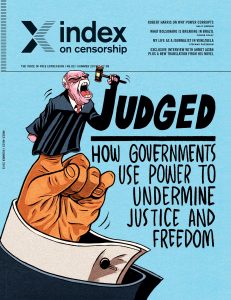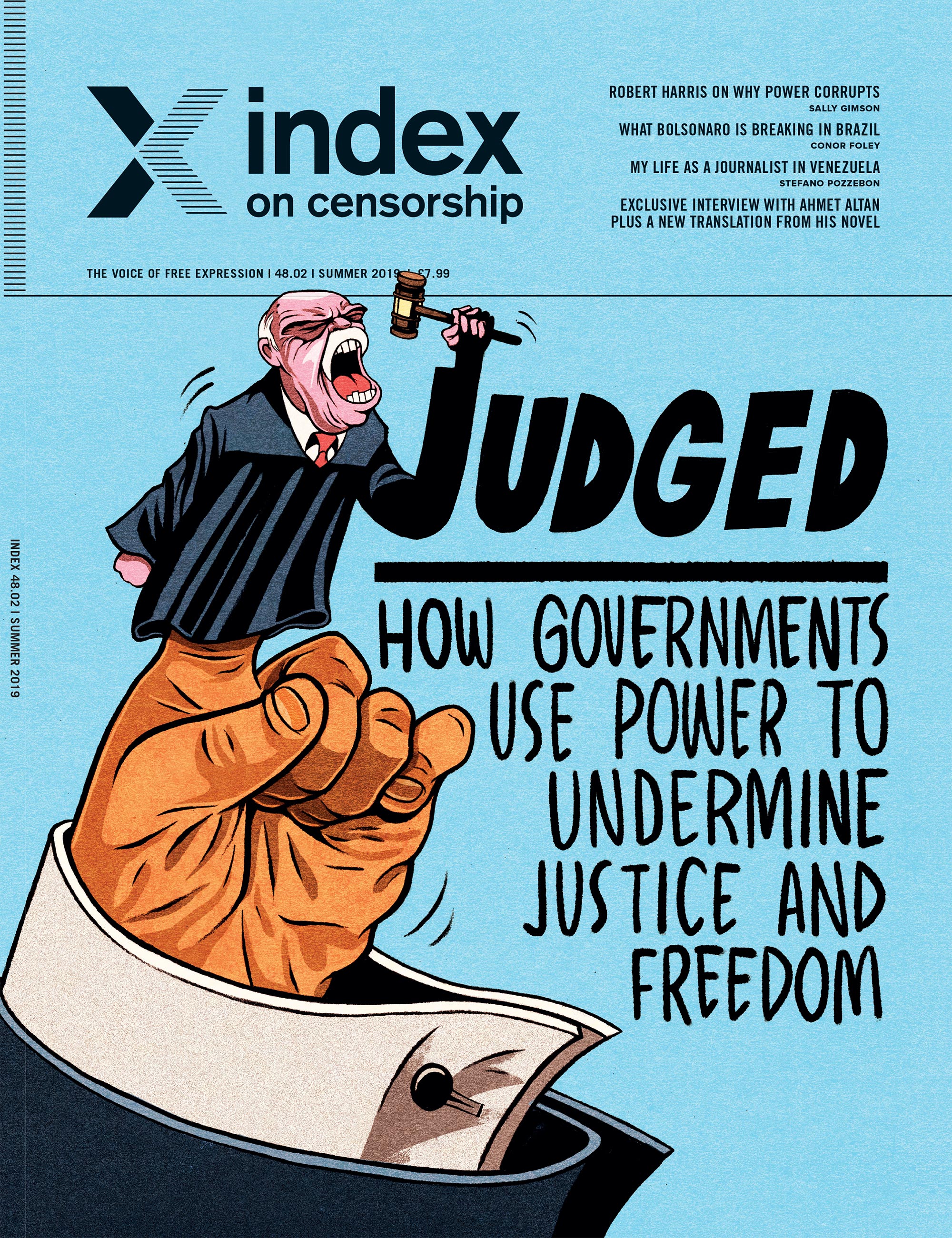[vc_row][vc_column][vc_video link=”https://youtu.be/cA4H7_d9q20″][vc_column_text]
The summer 2019 Index on Censorship magazine looks at the narrowing gap between a nation’s leader and its judges and lawyers. What happens when the independence of the justice system is gone and lawyers are no longer willing to stand up with journalists and activists to fight for freedom of expression? Free expression is vital to inform — and criticise — the actions of the authorities who have the power to take it away. Music has long been a form of popular rebellion, especially in the 21st century where it is easier than ever for artists to distribute and share their songs. This playlist compiles a selection of songs written about, and around, the threats to free expression touched on in this issue. The songs give insight into everything from the nationalism in Viktor Orban’s Hungary to the role of government-controlled social media in China to poverty in Venezuela.
[/vc_column_text][/vc_column][/vc_row][vc_row][vc_column][vc_column_text]
 Punch Brothers, Jumbo
Punch Brothers, Jumbo
The Punch Brothers is a folk-bluegrass band headed by virtuoso mandolinist Chris Thile. Jumbo is a song from their most recent, Grammy-winning album All Ashore. It is a satirical song mocking an ineffectual American leader that comes from immense privilege, meant to criticize the presidency of Donald Trump. Throughout the song, the titular character is portrayed living a lavish life while the institutions around him flounder. Jan Fox’s article in the most recent magazine covers Trump’s effect on American institutions, much of what the Punch Brothers song aims to mock.
Franz Liszt, Ad nos, ad salutarem undam
Liszt spent a large portion of his career in the Weimar region of Germany — the subject of Regula Venske’s recent piece on the intellectual history of the area. Liszt capitalized on the rich musical history of the region in composing Ad nos, ad salutarem undam, which was based on Act I of Giacomo Meyerbeer’s opera Le prophète. Weimar, in addition to being known for the classical writers Venske discusses, was also famous for long, dramatic organ pieces, going back to J. S. Bach. Liszt employed that history when writing Ad nos, ad salutarem undam.
Bobi Wine, Afande
Bobi Wine, a Ugandan songwriter and politician, was interviewed by Lewis Jennings for Index Magazine. Incorporating elements of reggae, dancehall, and afrobeat, his music often communicates political statements about freedom in Uganda. Wine wrote Afande in April 2019 while under house arrest for two days. He has served in the Ugandan parliament since April 2017, and was arrested by political rivals. The word “afande” means military policeman, and the song protests the police violence that Wine has experienced in Uganda.
Gilberto Gil, Domingo no parque
Gilberto Gil began his career as a bossa nova musician, a genre that fuses traditional Brazilian music with samba, jazz, and French classical melodies. Gil was instrumental in the Tropicalia movement, which took inspiration from bossa nova and American rock, though it was far more political. Domingo no parque was the song that propelled him to solo fame, from his second self-titled album. Gil later went on to have phenomenal musical success and a political career: he served as minister of culture in the early 2000s under the popular Lula de Silva, who was eliminated from the most recent Brazilian election following corruption charges. Jair Bolsonaro, the subject of Conor Foley’s article on 26, ended up winning the election.
FFC Acrush, Action
FFC Acrush, now known as FanxyRed after the departure of three out of its original seven members, is one of many Chinese Pop (or c-pop) bands that has built its following on the government-controlled Chinese social media site Weibo. Weibo is monitored by the government as referenced in Karoline Kan’s and Xinran’s pieces on pages 23 and 74. FFC Acrush has received increased attention due to the androgynous style of its members — homosexuality, though decriminalized, is still taboo in Chinese society, and the band in many ways represents recent generations’ evolving attitudes in the face of strict cultural norms.
The Police, Invisible Sun
The Police’s frontman, Sting, wrote Invisible Sun while living in Ireland during the Belfast hunger strikes during the troubles. Sting’s first wife was Irish which led him to move to Galway in the 1980s. Ten Irish nationalist inmates in Northern Irish prisons died as a result of the hunger strikes, which the song commemorates. As Ryan McChrystal writes, Northern Irish institutions still lack public trust, because of the lack of transparency in their dealings. The aftereffects of the Troubles are still felt in Ireland and Northern Ireland today.
Ali Primera, Techos de Carton
Ali Primera was a Venezuelan activist and musician in the 1960s and 1970s. His music came to define a generation of Venezuelans, particularly the working classes. Techos de Carton, or cardboard roofs, tells the story of the poverty faced by many Venezuelans, a story that is all too familiar today. Melanio Escobar and Stefano Pozzebon discuss how conditions have worsened in Venezuela following a long period of economic and political unrest, conditions that may be again reflected in the music of Ali Primera.
Erkel Ferenc, Hazám, hazám
Hazám, hazám (My homeland, my homeland) is an aria from the opera Bánk Bán, by Erkel Ferenc. Viktoria Serdult discusses the changes in Hungary’s institutions following the rise of Viktor Orban. In addition to the increased pressure on the judiciary, press, parliament, and electoral system, Orban (in typical nationalist fashion) has increased funding to the arts to glorify Hungary’s history. Bánk Bán is considered the national opera of Hungary, one of several put on in the most recent season of the Hungarian State Opera House following an increase in funding.
Radiohead, Electioneering
Radiohead’s Electioneering, from their seminal album OK Computer, was written in the wake of UK Prime Minister Tony Blair’s election in 1997. Radiohead members, who were sceptical at the time of the new direction in which Blair pledged to take the Labour Party, wrote the song Electioneering about corrupt politics and the tactics employed by the power hungry to remain in power. Many of the pieces in the Index magazine talk about the corruption of politics, including several that touch on the ways in which corrupt officials manipulate elections to remain in power.
La Voz del Desierto, Sin Tu Calor
La Voz del Desierto is a band from Madrid, Spain. Three of its members are ordained Catholic priests, and their music brings Spanish Catholicism into the 21st century. In her piece Silvia Nortes examines why the Catholic church has maintained prominence and power in Spain, even while its influence is diminishing elsewhere in Europe. Modern rock bands like La Voz del Desierto, which go on US tours and are popular within Spain and Portugal, connect the public with the church through music.
[/vc_column_text][/vc_column][/vc_row][vc_row][vc_column][vc_basic_grid post_type=”post” max_items=”4″ element_width=”6″ grid_id=”vc_gid:1561647837045-68e87787-0278-4″ taxonomies=”7819″][/vc_column][/vc_row]













